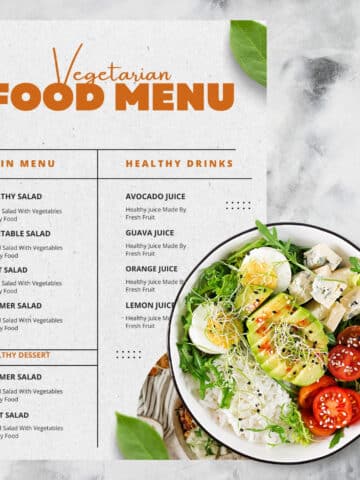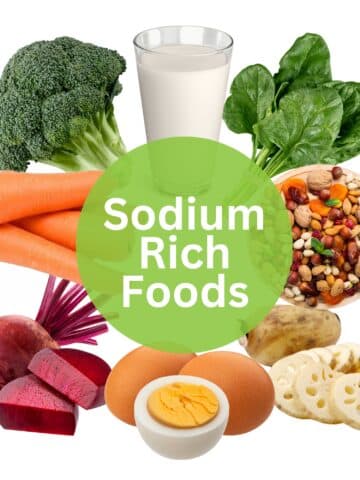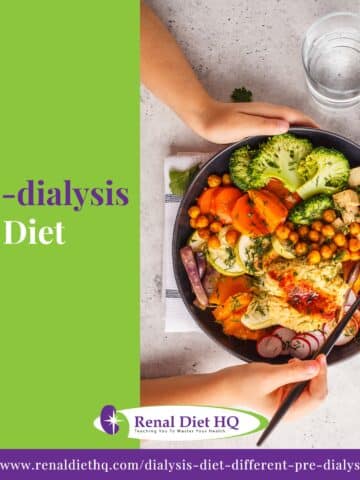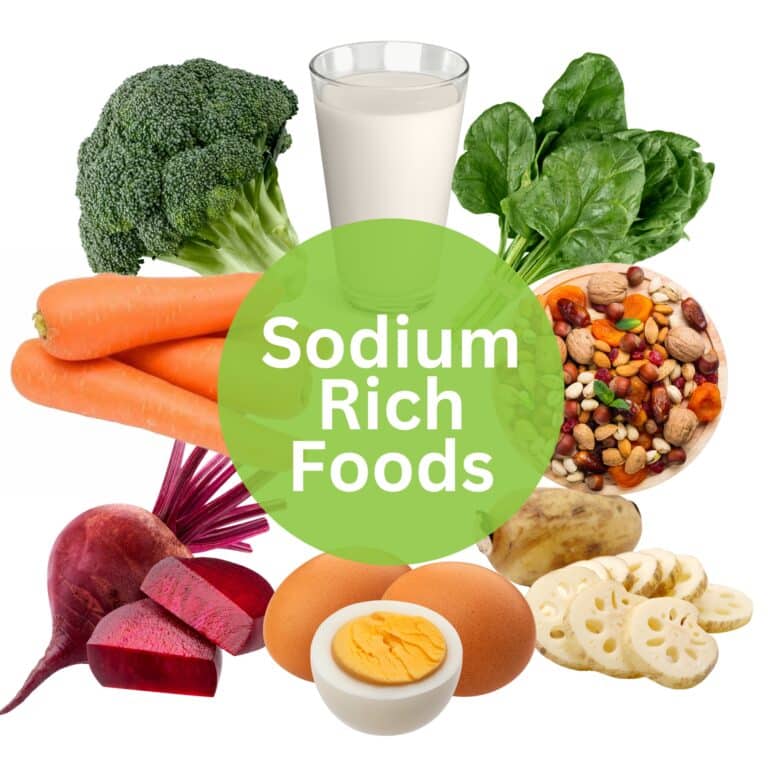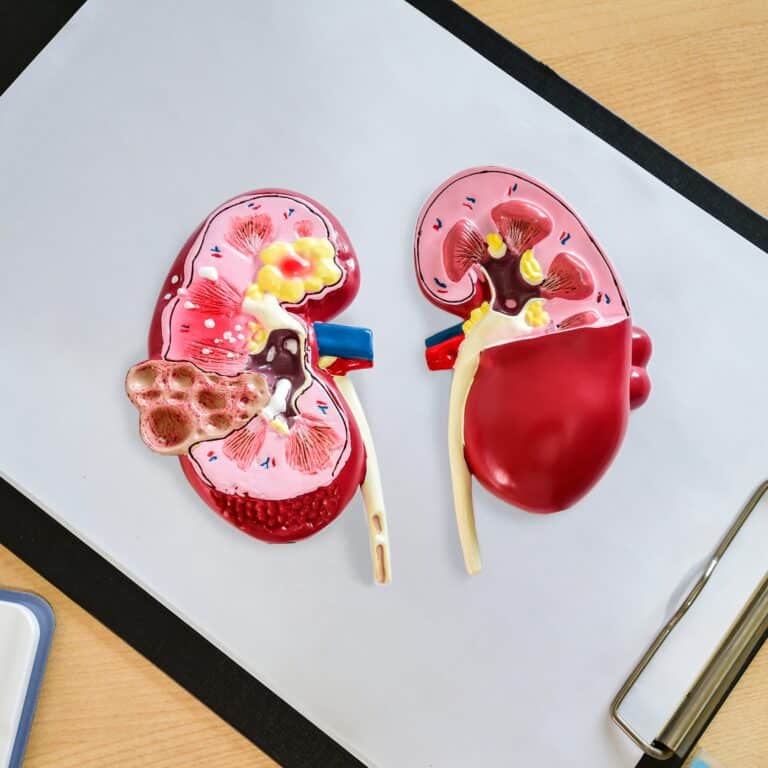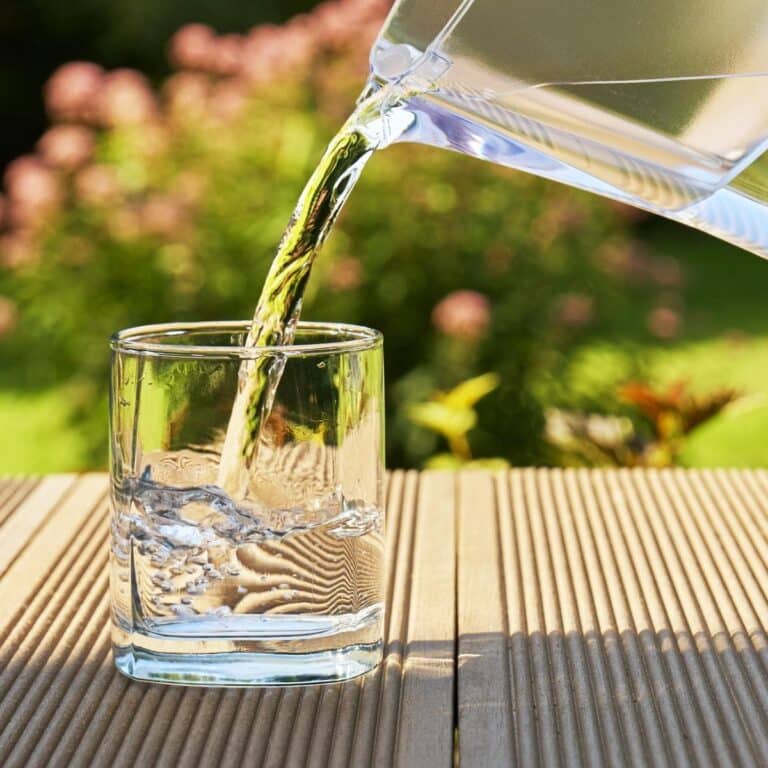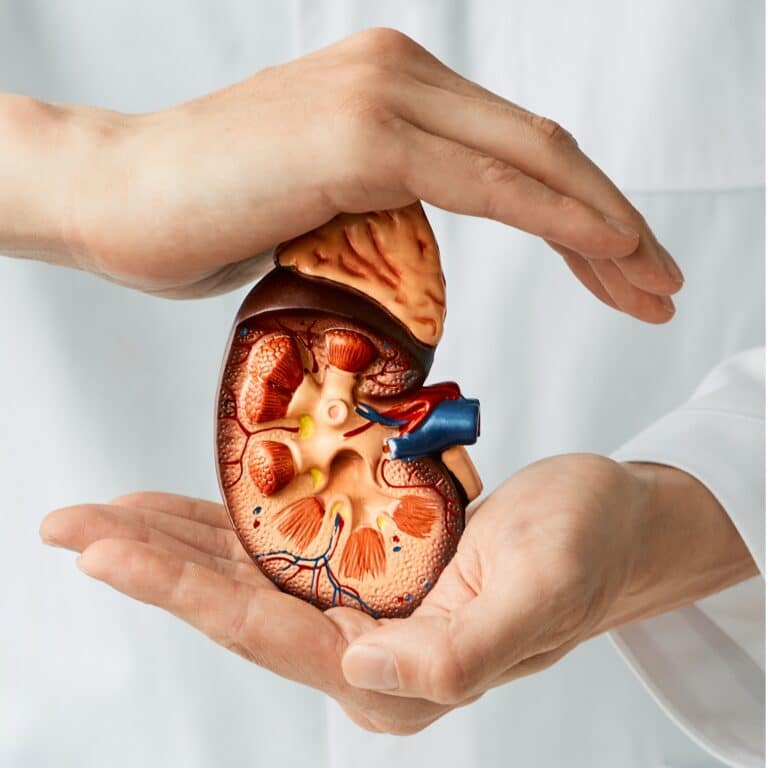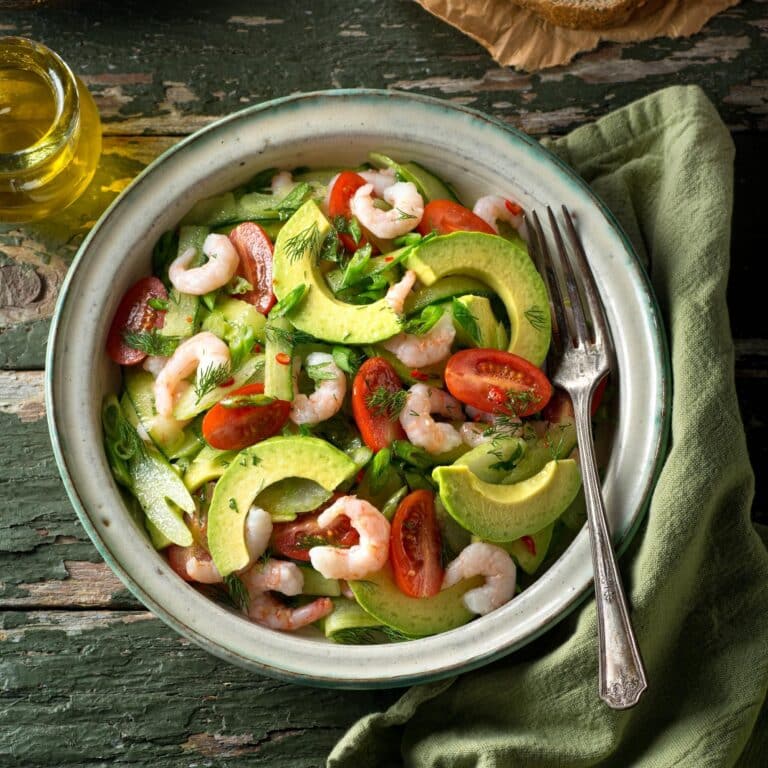Easy Diet Plan Predialysis
For kidney disease patients getting ready to go through dialysis, there are many things you must do to prep your body. One of these things is following a sensible pre-dialysis diet.
At the later and end stages of renal disease, the diet you should follow becomes more restrictive. This is because your kidneys simply are not able to process and filter all of the excess waste in your body. Tips to avoid end stage renal disease.
Not following an appropriate diet at this stage of kidney disease can be extremely uncomfortable and can even cause serious problems such as shortness of breath, heart problems, or stroke.
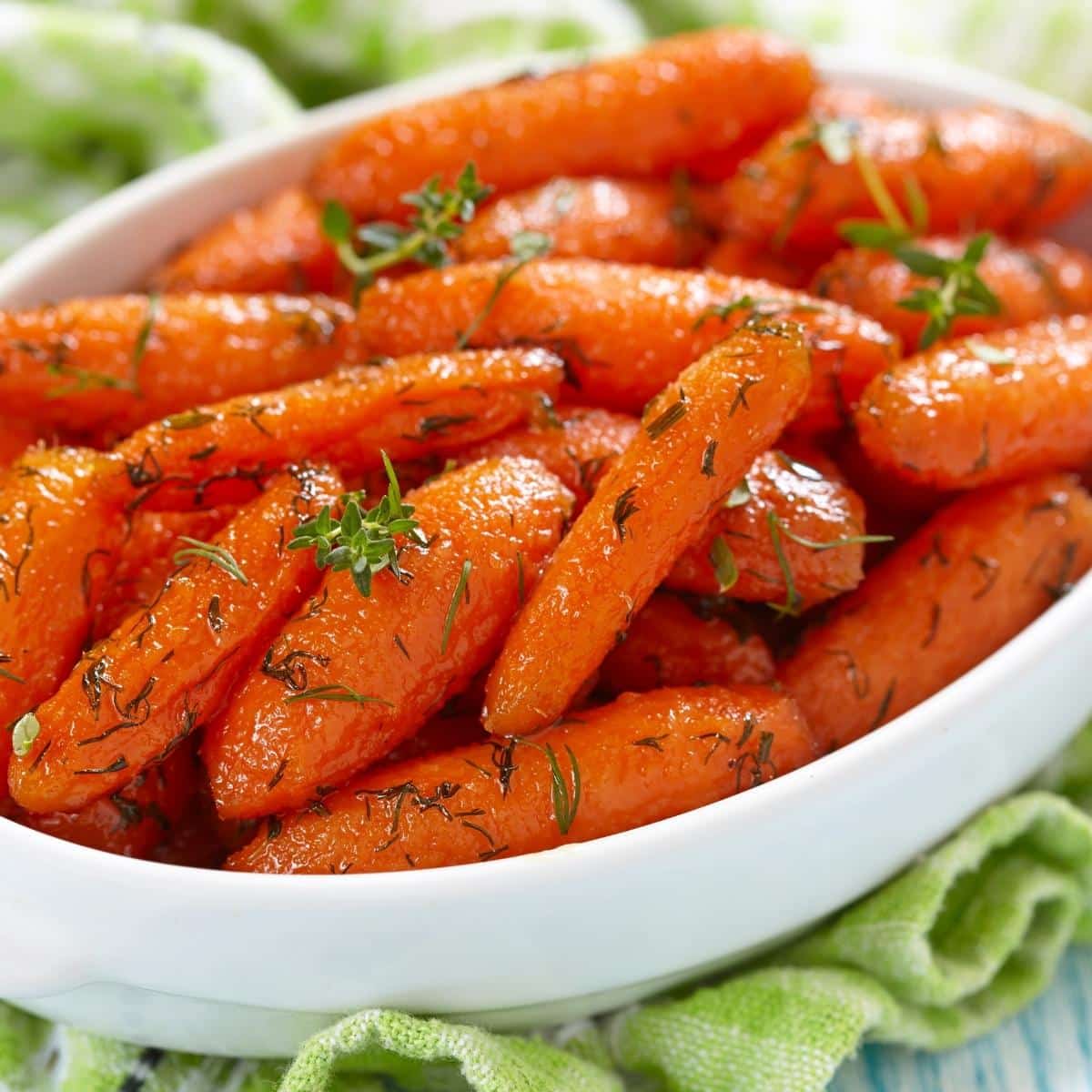
Jump to:
What Is A Predialysis Diet?
A predialysis diet is a meal plan designed to help individuals with kidney disease maintain their health. It includes foods that are low in sodium, fat, and protein, and high in vitamins and minerals.
It's important to plan meals that include a variety of foods from each food group and to be mindful of portion sizes. Eating a predialysis diet can help improve energy levels, reduce inflammation, manage weight, and can help slow the progression of chronic kidney disease and reduce complications.
Planning meals in advance can help make sure you're getting the right nutrients and staying within dietary restrictions.
There are many things that need to be restricted as part of a sensible pre-dialysis diet. These are some of the things you need to keep an eye out for:
Sodium: Sodium can cause fluid retention, swelling, and much more serious problems. Your doctor will most likely recommend a very strict monitoring of sodium intake. You can also learn how to season food without salt.
Fluid: End stage renal disease is often met with strict fluid restrictions. This is because your kidneys cannot filter out the excess fluid, which can cause build up that leads to some pretty serious complications. There are certain fluids to hydrate with kidney disorder.
Protein: When protein is ingested, it creates waste and byproducts that need to be filtered out of the system. Before dialysis, it will often be recommended that you follow a low protein diet.
After dialysis has started however, your doctor might say that a higher protein diet can be resumed.
Potassium: A buildup of potassium for a kidney failure patient can lead to muscle weakness, abnormal heart rate, and even heart attack.
Since the kidneys cannot flush out the excess potassium, patients are recommended to severely limit potassium in their diet.
Phosphorus: While phosphorus binders are often prescribed for renal patients, it is still an ingredient that needs to be monitored. Phosphorus buildup can leach calcium from bones, making them brittle.
For More Recipes and Ideas --->> Get Your Free Meals and Recipes That Are Perfect for Pre-Dialysis Diets, Pre-Dialysis with Diabetes, or Dialysis Diets.
Types Of Food
When it comes to creating an easy diet plan for predialysis, the types of food you choose are just as important as portion sizes and meal planning. Whether you’re looking for a low-sodium option or focusing on healthy fats and proteins, there's something in all the different food groups that can help you reach your nutrition goals.
Fruits and vegetables play an important role in any pre-dialysis diet - they provide essential vitamins, minerals and fiber while also helping lower cholesterol levels due to their high antioxidant content.
When choosing which kinds of produce to include into your diet plan make sure to opt for those which contain less potassium such as apples, berries, grapes, spinach and broccoli.
Finally, lean proteins like chicken or fish are great for maintaining muscle mass while providing vital nutrients necessary for overall health maintenance; incorporating heart-healthy unsaturated fats from foods like nuts and olive oil will help ensure balanced nutrient intake as well!
With some knowledge about portion control, meal planning and understanding the importance of including certain types of food into your diet plan – living a healthier lifestyle before dialysis begins is more achievable than ever!
Benefits
Having a predialysis diet plan is beneficial in many ways. A sensible pre-dialysis diet will help with a lot of things. First of all, the right diet can help to assure that your body is better able to process everything you put into it.
This type of dieting helps reduce fatigue caused by electrolyte imbalances which increases energy levels so that you can be more active throughout the day.
Additionally, following this kind of eating pattern allows for better control over blood pressure as well as improved kidney function due to increased hydration from adequate fluid consumption. All these benefits add up to an overall healthier lifestyle before dialysis begins!
Meal Planning
Meal planning is an important part of pre-dialysis care. It involves creating nutritious meals that are good for your health and also help you manage fluid balance and electrolyte levels in the body.
To make sure you get all the essential nutrients, it's important to have a basic understanding of cooking basics like portion control, hydration tips and smart shopping.
For example, incorporating lean proteins such as fish or chicken can provide vitamins and minerals while reducing saturated fats from red meats which can increase cholesterol levels.
Also, be mindful of sodium intake by avoiding processed foods and instead opting for fresh fruits and vegetables – they’re full of fiber, antioxidants, vitamins and minerals!
Lastly, drinking plenty of water throughout the day helps flush out toxins in addition to keeping hunger at bay so that we don't overeat. Eating healthier doesn't mean sacrificing flavor - with meal planning comes delicious recipes tailored to meet our dietary needs!
Need help putting together a meal plan? View this 7 day renal diet meal plan to get a better idea of what you can consume.
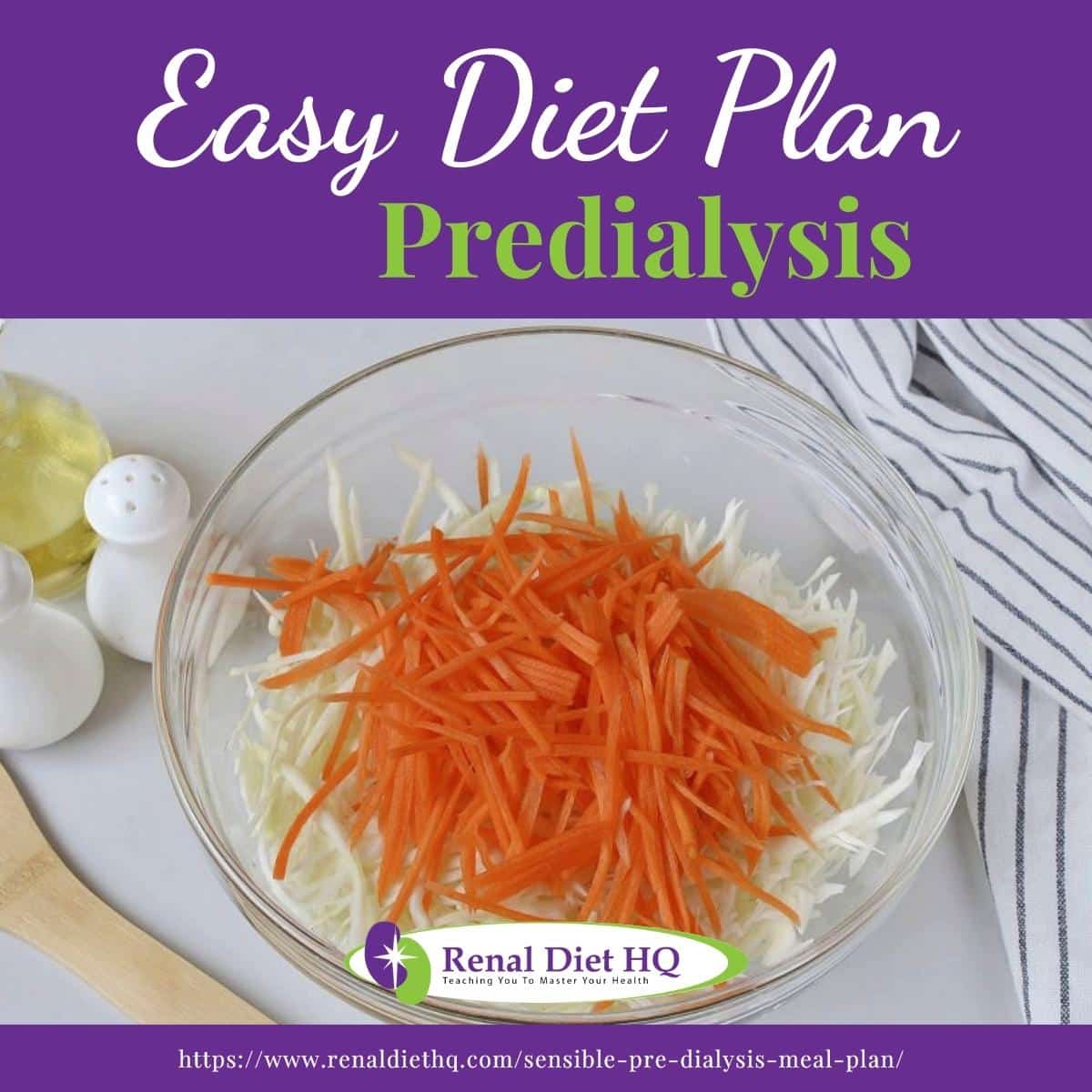
What Foods To Include
I think we should start off by discussing fruits and vegetables, since they are important sources of vitamins, minerals, and fiber. Whole grains are another great source of fiber, vitamins, and minerals too, so those should also be included in the diet.
Lastly, lean proteins, low-fat dairy, healthy fats, nuts, seeds, legumes, fish, eggs, herbs, spices, water, and plant-based oils should all be incorporated for a balanced diet.
Another important factor in an easy diet plan predialysis is dehydration management. Maintaining proper hydration helps reduce strain on the kidneys by helping flush toxins out of the system faster. Keep up to date on which fluids to hydrate with kidney disease.
It also keeps electrolyte levels up which are essential for healthy functioning. Be sure to drink plenty of water throughout the day – aim for at least 2 liters!
Fruits
Fruits are one of the most delicious and nutritious food items to include in your diet plan! Not only do they provide essential vitamins and minerals, but their fiber content helps with digestion.
Meal prepping is an easy way to incorporate kidney friendly fruits into your daily routine - simply prepare ahead of time so that you have a healthy snack ready when hunger strikes.
Lastly, make sure to stay hydrated with water throughout the day and enjoy some fresh fruit instead of processed snacks for extra nutrition.
Portion control plays an important role in making sure you’re not overeating on sugary or high-calorie snacks, particularly if you are diabetic.
With these simple tips, it's easier than ever to create a balanced diet plan full of energizing fruits!
Vegetables
The next food item to include in a balanced diet is vegetables! Plant-based eating has been gaining popularity lately due to its many health benefits, so why not give it a try?
Not only are they packed with essential vitamins and minerals, but veggies also offer plenty of snack options that you can easily pack for on-the-go.
When dining out, look for grilled or steamed vegetable dishes as an alternative to higher calorie entrees.With these helpful tips and tricks, adding variety to your weekly meals becomes easier than ever before. There's no need to sacrifice flavor either - delicious veggie dishes await!
You may also want to look into leaching vegetables to have even more vegetables access!
What Foods To Avoid
If you're on a predialysis diet, it's best to avoid processed foods, fast food, and sugary drinks. Processed foods are a big no-no on a predialysis diet; they are typically packed with unhealthy fats, sodium, and preservatives.
Fast food should also be avoided; it's loaded with fat, calories, and sodium. Keep in mind that there are some fast foods that are okay for kidney disease.
Sugary drinks are another thing to watch out for; they can contribute to weight gain and even increase your risk of diabetes. Avoid processed foods, fast food, and sugary drinks and you'll be much healthier for it in the long run!
Processed Foods
It's no secret that processed foods are unhealthy, yet it can be hard to avoid them. Eating out and portion control can help keep us from consuming too many of these items.
When you're at the store, reading nutrition facts labels with CKD is vital – even if something looks healthy on the outside, it could still contain a lot of processed ingredients!
And when eating out, pay attention to portion sizes: restaurants tend to serve bigger portions than necessary.
It's important to know how much food your body actually needs so that you don't overindulge.
Fast Food
When it comes to eating out, fast food is one of the worst choices you can make. These meals are loaded with unhealthy ingredients and sodium. Look for healthier options that don't contain too much fat or sugar.
Additionally, remember portion control while at a fast-food joint; order just enough so that you're not consuming excessive amounts of junk food.
With some planning and mindful decisions, we can still enjoy our favorite restaurants without overindulging on unhealthy items and keep ourselves healthy! There are some fast food items to avoid with ckd.
Sugary Drinks
Staying hydrated is key to keeping our bodies functioning properly, but sugary drinks can easily derail that effort. We should be mindful about what we drink when eating out, as processed juices and sodas are often loaded with sugar and have little nutritional value.
What juices are good for kidney disease? Instead of drinking these unhealthy beverages, opt for water or unsweetened tea – this way you'll avoid consuming too much sugar while still staying hydrated!
So next time you're at a restaurant or cafe, make sure you remember the importance of mindful eating when selecting your beverage - because healthier choices lead to healthier lives!
Acidic Food Restriction
A good place to start your renal diet is with managing your pH balance. Eating acidic foods can throw off your body's internal chemistry because they can contribute to the buildup of acid in the blood, a condition known as metabolic acidosis.
This can worsen kidney function and lead to further complications. A diet high in acid-forming foods can also contribute to the formation of kidney stones.
Here are some examples of acidic foods to avoid or limit in kidney disease:
Meat and poultry: Beef, pork, chicken, and turkey are high in purines, which can increase the production of uric acid in the body. Opt for plant-based protein sources or lean meats in moderation.
Fish and seafood: Some fish, such as anchovies, sardines, and shellfish, are high in purines. Choose low-purine fish like salmon, trout, or flounder instead.
Dairy products: Full-fat dairy products can be acid-forming. Choose low-fat or non-dairy alternatives when possible.
Processed foods: Processed meats, canned soups, and packaged snacks often contain high levels of sodium, phosphorus, and additives that can contribute to acidosis. Opt for fresh, whole foods instead.
Sugary foods and beverages: Soft drinks, candy, and pastries can be acid-forming and should be limited.
Alcohol: Can you drink alcohol on dialysis? Alcohol can increase the production of uric acid and should be avoided or consumed in moderation.
Some fruits and vegetables: While most fruits and vegetables are alkaline-forming, a few, such as tomatoes, spinach, and rhubarb, can be acid-forming. Consult with a dietitian to determine which fruits and vegetables are best for your specific needs.
It's essential to work with a healthcare professional or dietitian to create a personalized meal plan that meets your nutritional needs while managing kidney disease.
They can help you identify the right balance of alkaline and acidic foods to maintain optimal health.
Here are some additional tips:
- Monitor portion sizes as overeating can lead to weight gain and put extra stress on the kidneys over time
- Increase fiber intake through fruits, vegetables, nuts and whole grains
- Limit caffeine consumption as it may increase blood pressure and further damage already weakened kidneys
- Get regular exercise as this helps maintain muscle strength, improve circulation, and boost overall energy levels
- Drink herbal teas that are known to be beneficial for kidney function such as chamomile, dandelion root, nettle leaf and licorice root tea
An easy diet plan predialysis requires careful consideration when it comes to what you eat and drink each day. By following these guidelines you'll be well on your way towards regaining better control over your health!
Sodium And Potassium Restriction
Sodium and potassium are essential minerals in the diet, but if you have kidney disease or hypertension, reducing sodium and potassium intake is key. Sodium restriction can help lower blood pressure and reduce the risk of kidney disease, while a low potassium diet may help prevent heart failure.
Sodium
When it comes to pre-dialysis kidney diet, sodium and potassium restriction are essential. We need to be aware of the amount of salt we take in from our food. Salt substitutes can offer us a great way to reduce the amount of sodium without compromising on flavor.
For example, spicy herbs like oregano or garlic powder are excellent alternatives to table salt. You will have an easier time following a low sodium kidney diet with these tips.
We must also consider how hydrated we are when following this easy diet plan for pre-dialysis kidney disease. Adequate fluid balance is key in keeping your electrolyte levels balanced so try drinking 2 liters of water each day.
Additionally, eating smaller meals more often throughout the day helps with managing both sodium and potassium levels in the body while providing energy throughout the day.
Finally, planning ahead is an important factor when trying to follow a pre-dialysis diet plan successfully; meal timing plays a huge role here! Make sure you eat regular meals at set times during the day rather than having large portions every few hours.
This will go a long way towards helping you stick to your dietary goals and give yourself optimum nutrition through carefully selected foods which don't contain too much sodium or potassium.
Potassium
When it comes to pre-dialysis diet plans, knowing how much potassium you are taking in is just as important as being mindful of your sodium intake.
Foods high in potassium that should be avoided or limited on a kidney diet include: Bananas, kiwis, potatoes, spinach and dried fruits like raisins and apricots. Here are a few vegetables low in phosphorus and potassium.
Aside from tracking the amount and types of food you eat, there are several ways that can help make meal prepping easier while still controlling your portions. One way is utilizing renal friendly recipes which account for specific hydration needs associated with kidney health diets.
Preparing meals ahead of time allows you to have a plan for what days and times you will be having each meal throughout the week, making portion control simpler and more efficient.
This helps keep both your electrolyte levels balanced and provides energy over the course of the day without compromising on flavor or nutrition. Taking all these factors into consideration when planning out meals makes sticking to dietary goals much easier!
Fiber
Fiber is an important part of a healthy diet, and understanding its benefits and sources can help you make the most of your eating plan. Dietary fiber comes from plant-based foods, such as fruits, vegetables, legumes and whole grains.
Eating more dietary fiber can bring several health benefits to those with predialysis—it helps manage blood sugar levels, maintain regularity in the digestive system, lower cholesterol levels, prevent heart disease and reduce inflammation.
There are two types of dietary fiber: soluble and insoluble. Soluble fiber dissolves easily in water; it's found in oat bran, barley, nuts, seeds, beans, lentils and some fruits like apples, oranges and strawberries.
Insoluble fibers don’t dissolve in water; they're found in wheat bran, vegetables and whole grains. Both kinds of dietary fibers provide essential nutrients for your body that other types don't have.
It’s recommended to get at least 25–30g daily for adults on a 2000-calorie diet. For people with predialysis specifically though, this number may be higher depending on their medical situation so always check with your doctor first before making any changes to your current food intake or lifestyle habits.
When increasing your fiber intake it’s best to do it gradually rather than all at once since drastic increases might cause stomach discomfort or even worse problems if not monitored properly by a healthcare professional.
In addition to these tips for managing your fiber intake when you have pre-dialysis needs there are also many delicious recipes available online that include high amounts of both soluble and insoluble fibers that will leave you feeling full longer while giving you the energy needed throughout the day!
Carbohydrates
Carbohydrates are an important part of any diet but should be chosen wisely in order to get maximum benefit from them.
Complex carbohydrates such as whole grains, legumes and vegetables are better than simple carbs like white breads, cakes and pastries which will spike your blood sugar levels quickly then drop just as fast leading to fatigue.
Eating more complex carbs will keep your energy levels steady while providing essential vitamins and minerals needed for optimal health.
When meal planning, incorporate foods that contain carbohydrates, protein and fats all in one dish. This creates balance between macronutrients while packing more nutrition into each bite so you don't need large portions to feel full.
Try adding beans or lentils to salads, soups or stews; nuts and seeds make great toppings on oatmeal (oatmeal and kidney disease) or yogurt; roasted veggies can be served over brown rice with some olive oil drizzled over top for added flavor; even desserts can be made healthier by using fruit purees rather than processed sugars whenever possible.
Making small changes like these throughout your day-to-day eating habits can make a huge difference in how you look and feel without sacrificing taste or satisfaction from your meals. It's never too late to start making smarter decisions about what goes onto your plate - take control today!
Fat
It's important to know that not all fats are created equal; some types like saturated fat should be eaten in moderation as part of an easy pre-dialysis diet plan.
When eating out, portion control is key when it comes to consuming fats. A few simple tips can help you stay mindful while dining out: consider splitting entrees with friends or family and always ask for salad dressings and sauces on the side so you can monitor your intake more closely.
Additionally, avoiding fried foods may also reduce your overall consumption of unhealthy fats.
Including healthy sources of unsaturated fat into your diet is a great way to keep cravings at bay and promote overall wellbeing during pre-dialysis phases. Opting for foods such as nuts, seeds, and olive oil will provide essential fatty acids needed for proper functioning of hormones and body systems.
Hydration throughout the day is also important for mitigating fatigue associated with dialysis treatments; incorporating healthy fats into snacks helps ensure adequate hydration by increasing satiety longer which reduces snacking between meals.
It's clear that making smart decisions about food choices can contribute significantly to one’s health before beginning dialysis treatments – especially when it comes to choosing nutritious sources of fat over processed options full of saturated fat.
Eating balanced meals rich in heart-healthy oils allows us to feel energized and satisfied while still keeping our health front-and-center!
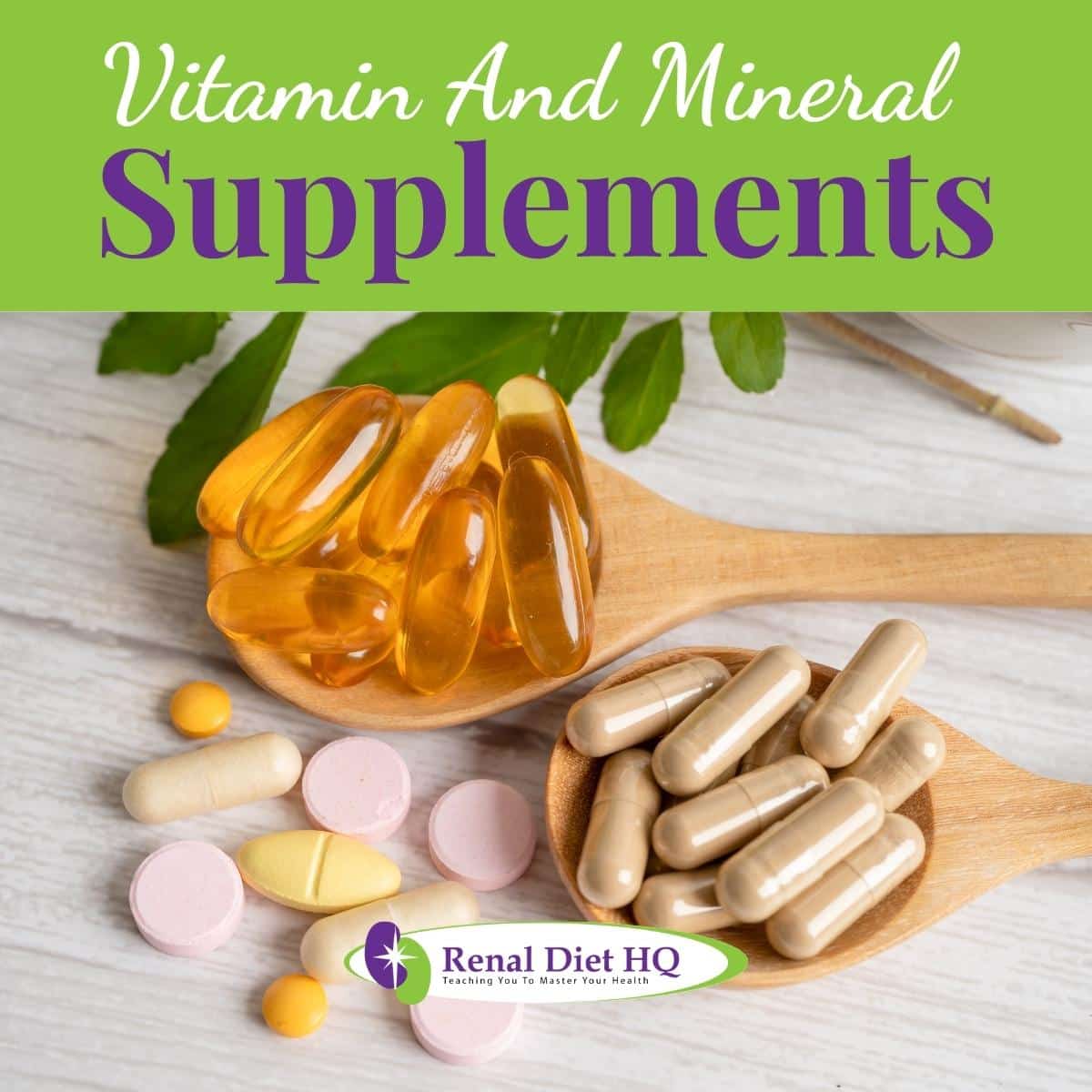
Vitamin And Mineral Supplements
It is important to know that vitamins and minerals are essential for maintaining a healthy lifestyle. Knowing the sources of these nutrients can help you develop an easy diet plan prior to dialysis.
The primary source of vitamin intake should be through food, as it provides more benefits than just taking supplements alone. Eating a balanced diet comprised of fresh fruits and vegetables, whole grains, lean proteins, and dairy products can provide your body with all the necessary vitamins it needs.
Additionally, certain types of fish such as salmon and sardines contain high levels of omega-3 fatty acids which can reduce inflammation in the body.
Minerals also play a vital role in proper nutrition. The best mineral sources come from foods like almonds, spinach, sweet potatoes, beans, legumes, fortified cereals or whole grain breads/pastas. It is recommended to focus on consuming naturally occurring minerals found in plant-based foods rather than relying solely on supplementation.
Making A Diet Plan Easier To Follow
I think it's important to consider all aspects of diet planning when making it easier to follow, such as eating mindfully, tracking nutrition, meal prepping and building variety.
Grocery shopping tips, meal planning strategies, healthy eating habits, reducing cravings and eating out smartly are all necessary to consider. You may enjoy this book on eating out with kidney disease as much as I do!
We should also be mindful of making lifestyle changes, getting support, avoiding unhealthy foods, sticking to regular meals, and portion control.
All of these strategies can help us make our diet plan easier to follow and manage.
Tracking Nutrition
Now that we've discussed mindful eating and how it can help make a diet plan easier to follow, let's talk about tracking nutrition.
Meal planning, portion control and hydration levels are all important aspects of nutritional tracking. It can be hard to keep track of everything on your own - but luckily there are plenty of apps out there to help you do just that!
By monitoring your meals and lifestyle changes, you'll be able to make more informed decisions when it comes time to eat.
Plus, by having an accurate picture of what you're consuming each day, you'll have peace-of-mind knowing that you're getting the right amount of nutrients without overindulging or under-eating. So don't wait any longer - start taking charge of your health today with meal planning and nutritional tracking!
FAQs for Pre-Dialysis Meal Plan
It's important to consult with your doctor regularly if you're on a predialysis diet. The frequency of these visits will depend on the severity of kidney damage and other medical conditions, but generally it's recommended to be seen every 1-3 months.
During each visit, eating habits, salt intake, and portion control should all be discussed in detail so that any changes can be tracked over time. This way, you'll have peace of mind knowing that your body is receiving the nutrition it needs without putting too much strain on your kidneys.
Why do I need a pre-dialysis diet plan? When it comes to improving your pre-dialysis diet, lifestyle changes can go a long way. From eating healthier, more balanced meals and snacks to being conscious of fluid intake, there are many steps you can take to upgrade your diet plan.
Additionally, incorporating regular physical activity into your routine helps maintain healthy weight levels and promotes good blood glucose control. To make the biggest impact on your pre-dialysis diet, consider revamping your food choices as well as exercise routine.
Try swapping processed foods for fresh produce or lean proteins; this simple step can have profound effects on both health and wellness!
When it comes to pre-dialysis diets, customizing your needs is key. Other chronic conditions you might have like diabetes or hypertension and any medications you are currently following can all have an impact on your nutrition needs.
Consulting with a doctor can help you adjust your lifestyle and diet accordingly for optimal enjoyment and health benefits. Keeping in mind the importance of customization is essential for managing any condition that might be affected by dietary changes.
With proper guidance from healthcare professionals, you can create an individualized plan tailored to your specific situation.
Following a pre-dialysis diet isn't just about sticking to strict dietary restrictions - it can also prevent serious implications for your renal health and kidney function.
Unfamiliar with the potential side effects? Buckle up, because we're taking you on a journey through what could happen if you don't take care of yourself when following this type of diet plan.
From unexpected changes in weight to increased risk of dehydration or even nutrient deficiencies due to modified food intake and limited access to certain dietary supplements.
It's important to consider all of these variables before making any drastic modifications to your lifestyle. So get ready to revamp your approach to eating as you strive towards better renal health!
An example of a sensible pre-dialysis meal plan is:
Breakfast Omelet with onion, bell peppers, and mushrooms.
Lunch Chicken salad made with fresh cooked chicken, mayonnaise, celery, chopped apples, and fresh ground pepper. Eat on a sandwich with white bread, or with unsalted crackers.
Dinner Baked fish with white rice and steamed veggies.
Snack Carrots with hummus. Small apple sliced with 1 tablespoon natural peanut butter.
Beverages Stick to water whenever you can, but drinks such as lemonade are also permitted. Remember to keep a strict eye on how much fluid you are consuming.
Closely monitoring your fluid intake will make dialysis more comfortable. You can also check out these kidney friendly drinks.
Enjoy An Easy Pre-Dialysis Diet Just For You
Maintaining a pre-dialysis diet is an important part of managing your condition and preparing for dialysis. It's essential to consult with a doctor about any lifestyle changes you're making, as well as the specific dietary requirements for your condition.
A sensible pre-dialysis diet or a CKD Diet plan will help with a lot of things. First of all, the right diet can help to assure that your body is better able to process everything you put into it.
Second of all, following the recommended diet suggestions that your doctors make will help make dialysis more comfortable for you and ensure its effectiveness.


